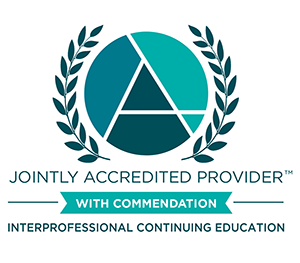- EMILY JUMPER
- Samantha Frame
Series Overview
APP Grand Rounds works to provide continuing education for Advanced Practice Providers. Sessions will focus on evaluation and management of acute and chronic diseases across the lifespan as well as professional development topics. Presenters are asked to provide opportunities for learner engagement including case studies, pre/post quizzes, and interactive learning modalities.
Intended Audience
MD/DO, RN, APRN, Physician Assistants, Clinical Anesthetist, and Students
Planning Committee
| Kristen Panther, NP, Chair | Emily Jumper, MS.Ed, & Sam Frame, Coordinator | Zachary Goldberger, MD |
| Joan Hermsen, NP | Jillian Bodden Hoenisch, NP | Caitlin Weitzel, NP |
| Sara Brady Suing, PA | Anna Kunde, CRNA |
Accreditation
Accreditation Statement
 | In support of improving patient care, the University of Wisconsin–Madison ICEP is jointly accredited by the Accreditation Council for Continuing Medical Education (ACCME), the Accreditation Council for Pharmacy Education (ACPE), and the American Nurses Credentialing Center (ANCC) to provide continuing education for the healthcare team. |
Credit Designation Statements
American Medical Association (AMA) | |
The University of Wisconsin–Madison ICEP designates this live activity for a maximum of 1 AMA PRA Category 1 Credit(s)™. Physicians should claim only the credit commensurate with the extent of their participation in the activity. | |
American Nurses Credentialing Center (ANCC) | |
The University of Wisconsin–Madison ICEP designates this live activity for a maximum of 1 ANCC contact hour. ANCC pharmacotherapeutic contact hours will be calculated and awarded as appropriate per session to meet the needs of advanced practice nurses. | |
AAPA Category 1 CME credit | |
| The University of Wisconsin–Madison ICEP has been authorized by the American Academy of PAs (AAPA) to award AAPA Category 1 CME credit for activities planned in accordance with AAPA CME Criteria. This activity is designated for 1 AAPA Category 1 CME credits. PAs should only claim credit commensurate with the extent of their participation. |
Continuing Education Units | |
The University of Wisconsin–Madison ICEP, as a member of the University Professional & Continuing Education Association (UPCEA), authorizes this program for 0.1 continuing education units (CEUs) or 1 hour. | |
POLICY ON FACULTY AND SPONSOR DISCLOSURE
It is the policy of the University of Wisconsin–Madison Interprofessional Continuing Education Partnership (ICEP) to identify, mitigate and disclose all relevant financial relationships with ineligible companies* held by the speakers/presenters, authors, planners, and other persons who may influence content of this accredited continuing education (CE). In addition, speakers, presenters and authors must disclose any planned discussion of unlabeled/unapproved uses of drugs or devices during their presentation. For this accredited continuing education activity, all relevant financial relationships have been mitigated and detailed disclosures are listed below.
* Ineligible companies are those whose primary business is producing, marketing, selling, re-selling, or distributing healthcare products used by or on patients. The ACCME does not consider providers of clinical service directly to patients to be commercial interests.
Detailed disclosures will be available prior to the start of the activity.
Disclosures for Planning Committee
COMPETENCIES
ACGME/NURSING
Patient Care and Procedural Skills
Medical Knowledge
Practice-Based Learning and Improvement
Interpersonal and Communication Skills
Professionalism
Systems-Based Practice
NAM/NURSING COMPETENCIES
Provide Patient/Person-Centered Care
Employ Evidence-Based Practice
INTERPROFESSIONAL EDUCATION COLLABORATIVE COMPETENCIES
Interprofessional Communication
Teams and Teamwork
DIVERSITY, EQUITY, AND INCLUSION COMPETENCIES
Engage in Self-Reflection
Address Health Disparities
IP — COMPETENCE
As a result of participation in this educational series, members of the healthcare team will be able to:
- Incorporate knowledge, skills, and strategies into their practice in order to improve patient care
- Employ evidence based practice in their clinical role by learning about practice guidelines and standards across the clinical continuum
- Engage in effective interprofessional communication and collaborative relationships with peers
- Address health disparities by increasing awareness of inherant bias, population health and/or institutional practices

 Facebook
Facebook X
X LinkedIn
LinkedIn Forward
Forward